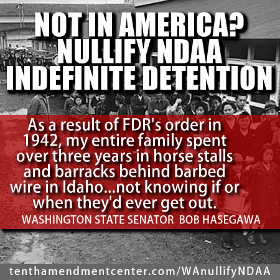 For Immediate Release: Feb. 4, 2013
For Immediate Release: Feb. 4, 2013
Washington state lawmakers will consider bipartisan legislation that would block any cooperation with attempts to indefinitely detain U.S. citizens or lawful resident aliens in Washington without due process under sections written into the 2012 National Defense Authorization Act.
If passed, the law would also make it a class C felony for any state or federal agent to act under sections 1021 or 1022 of the NDAA.
Rep. Jason Overstreet (R-Lynden) filed HB 1581 on Jan 31. Senator Bob Hasegawa (D – Seattle) filed a companion bill (SB 5511) a day later.
Both bills condemn sections of the NDAA allowing for indefinite detention without due process on American soil as unconstitutional and include provisions stopping any such attempts in the Evergreen State.
No state or local official or employee, or agent of the state of Washington, or employee of a corporation providing services to the state of Washington, or member of the national guard or state defense forces acting in his or her capacity as a state or local official or employee, or agent of the state of Washington, or employee of a corporation providing services to the state of Washington, or member of the national guard or state defense forces, shall knowingly cooperate with an investigation or detainment of a United States citizen or lawful resident alien located within the United States of America by the armed forces of the United States of America.
Hasegawa said the issue is very personal for him.
“On Feb. 19, 1942, President Roosevelt signed Executive Order 9066 that allowed the incarceration of all Americans of Japanese descent. As a result, my parents, grandparents, uncles, aunts, basically my entire family and their community, spent over three years in horse stalls at the Puyallup Fair and in barrack shacks behind barbed wire and armed guards at Minidoka Internment Camp in southern Idaho, not knowing if or when they would ever get out.”
Republican Rep. Matt Shea (R – Spokane Valley) cosponsored HB 1581. He said he considers it his duty to stand up for the basic civil liberties of his constituents.
“Indefinite detention means that due process is dead,” he said. “State legislators must defend against federal overreach. It is our duty. The oath we take in accordance with Article VI of the U.S. Constitution requires nothing less.”
Both bills enjoy bipartisan support, with the House version garnering 21 cosponsors. Three have signed on to the senate bill so far. The legislation also enjoys support from across the political spectrum, with both Democrats and Republicans signing on in support of the legislation.
“Once again, we see the bipartisan nature of the pushback against federal kidnapping,” Tenth Amendment Center national communications director Mike Maharrey said. “This is not a Republican issue or a Democrat issue. This is an American issue.”
Many in Congress continue to insist the indefinite detention provisions written into sections 1021 and 1022 of the NDAA do not grant the broad sweeping power opponents fear. But in a ruling the Obama administration continues to fight, U.S. District Court Judge Katherine Forrest ruled parts of the NDAA unconstitutional due to the overbroad nature of the language.
“A key question throughout these proceedings has been, however, precisely what the statute means–what and whose activities it is meant to cover. That is no small question bandied about amongst lawyers and a judge steeped in arcane questions of constitutional law; it is a question of defining an individual’s core liberties. The due process rights guaranteed by the Fifth Amendment require that an individual understand what conduct might subject him or her to criminal or civil penalties. Here, the stakes get no higher: indefinite military detention–potential detention during a war on terrorism that is not expected to end in the foreseeable future, if ever. The Constitution requires specificity–and that specificity is absent from § 1021(b)(2), she wrote. “The statute’s vagueness falls short of what due process requires.”
Washington joins 12 states considering bills to block NDAA detention within their borders. Virginia Governor Bob McDonnoll signed a similar bill into law last year. You can track efforts to block NDAA detention across the U.S. HERE.
ACTION ITEMS
If you are in Washington, please contact the members of the Public Safety Committee , and urge them to pass this bill to the house floor.
Contact the members of the senate Law & Justice Committee and urge them to support SB 5511.
You can also find all of your house reps here, and your senators here. We want to garner as much support as we can before these bills come to the floor for a vote.
Washington residents, if you’re on facebook, join this grassroots activism group:
http://www.facebook.com/groups/nullifyndaawashington/
LEGISLATION AND TRACKING
If you live anywhere outside of Washington, please contact your own legislators regarding anti-NDAA legislation. If none has been introduced in your state, you can email them The Liberty Preservation Act model legislation.
Track the status of NDAA nullification in states around the country HERE

